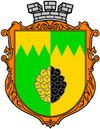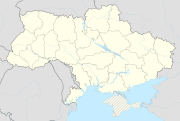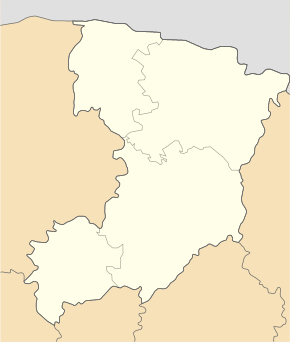Sosnowe
| Sosnowe | ||
| Соснове | ||

|
|
|
| Basic data | ||
|---|---|---|
| Oblast : | Rivne Oblast | |
| Rajon : | Beresne district | |
| Height : | no information | |
| Area : | 1.24 km² | |
| Residents : | 2,036 (2011) | |
| Population density : | 1,642 inhabitants per km² | |
| Postcodes : | 34652 | |
| Area code : | +380 3643 | |
| Geographic location : | 50 ° 49 ′ N , 27 ° 0 ′ E | |
| KOATUU : | 5620455700 | |
| Administrative structure : | 1 urban-type settlement , 5 villages | |
| Mayor : | Volodymyr Sydortschuk | |
| Address: | вул. Шевченка 5 34652 смт. Соснове |
|
| Statistical information | ||
|
|
||
Sosnowe (Ukrainian Соснове ; Russian Сосновое / Sosnowoje , Polish Ludwipol ) is an urban-type settlement in the western Ukrainian Rivne Oblast with about 2000 inhabitants. It is located on the Slutsch River , about 33 kilometers southeast of the Rajons capital Beresne and 57 kilometers northeast of the Oblast capital Rivne .
The settlement council municipality includes the villages Adamiwka (Адамівка), Velyki Selyschtscha (Великі Селища) Willja (Вілля) Hlybotschok (Глибочок) and Iwaniwka (Іванівка).
history
The place was founded in 1708 when the plague broke out in today's neighboring village Hubkiw and the place was badly affected by Swedes and Mongols. Ludwipol, named after the founder's wife, Ludwika, was part of the aristocratic republic of Poland-Lithuania in the Volyn Voivodeship until 1795 . Then it came to the newly founded Volhynia Governorate as part of the Russian Empire . After the end of the First World War the place became a part of the Second Polish Republic ( Voivodeship Volhynia , Powiat Kostopol, Gmina Ludwipol), after the outbreak of the Second World War the area was occupied by the Soviet Union and from 1941 by Germany , in 1945 it finally came to Soviet Union and was incorporated into the Ukrainian SSR . In 1946 the name was changed to Sosnowoje / Sosnowe, based on the extensive pine forests (Ukrainian Сосно / Sosno = pine) in the area. Since 1959 the place has had the status of an urban-type settlement, in 1991 the settlement was part of the newly established Ukraine.
The large Jewish community, around 75 percent of the town's inhabitants in the interwar period, was almost completely wiped out during the Second World War; the entire town was burned down during the war as a result of retaliatory actions by the German occupation against partisan movements and had to be completely rebuilt after the war.
Personalities
- Jacob Allerhand , German Judaist
Web links
- Ludwipol . In: Filip Sulimierski, Władysław Walewski (eds.): Słownik geograficzny Królestwa Polskiego i innych krajów słowiańskich . tape 5 : Kutowa Wola – Malczyce . Walewskiego, Warsaw 1884, p. 477 (Polish, edu.pl ).

